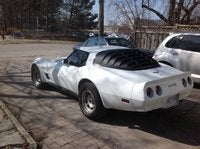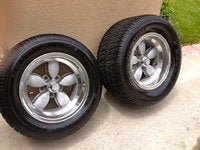1981 corvette vibrates after 100 mph
32 Answers
Have somebody look at it who repairs vehicles that operate at that specification. What does it do at about half that? That's where you need to find what's not round, running straight and true or has play that causes the changes you feel under that amount of stress. They say things are ok, but get the gauges out. Be sure you have V-rated tires or z-rated tires before you have a problem. what else can be said without seeing it to measure or having the condition to feel or view. Perhaps define the concern with further description, where is it felt ? First order or second order vibration. wiggle? shimmy? hop? Some cars respond well when everything's ok but they have this, to adding weight in the right place.
But being an 81, is everything measuring right ? every part that turns or swivels has been rebuilt? I just thought of a tester that a service engineer can use that electronically picks a vibration apart helping you know where to look. Ask your GM dealer. They may speed up the diagnostic time with their experience as well.
CamaroCollector answered 9 years ago
Tire pressures matched? What are the tires rated for as far as speed? Control arm bushings new? any suspension and steering upgrades? Drive shaft imbalance, I've had a few C3 Vettes and i just go through steering and suspension first thing because i'm a speed junky too. Remember high speeds require precision alignment and balance of all components.
Make sure you dont have add-ons or substitutions and bring all your receipts and print out for the 4wheel alignment, that can save some time too. ever had a collision? curb? jump? flat? replaced rotors? see what they can find, I suppose.
Not just balance but radial or lateral runout measurements can be taken. Even of wheel stud placement in rotors and flanges of axles. companion flanges, driveshaft tubes, etc. insulators for the engine and trans grounding out. There's no definite goto for this one.
Theres wheel runout measured at the bead with tire removed but wheel installed. that fixed a bunch of astros when I worked there, but they shaved the rubber instead of replacing wheels.
That does say something about tire construction and sidewall strength, as well as tread design. There was a bunch of explorers that calmed right down when wilderness A/T tires were substituted for the ATX's they had. They later recalled them for sidewall stiffness required lower pressures creating casing failure. never go to low unless you sponsor has a back-up car and many sets when you pit. hahaha
But seriously the pressures can be toyed with by decreasing and increasing enough all at once giving a clue. stay above 28 and try not to exceed the max rating by much. but look for a change. That can lead you to trading with a car that behaves and ending up having a different tire be the sweetness. Or your wheels.
if its a tire/rim problem you should have the same issue at 1/2 of 100 mph or 50 mph. but i dont think it a tire/rim issue
If you havent experienced the vibration, you really cannot say, substitutions eliminate these questions. The dealer has cars to get another set from. That's the reality of diagnosing a vehicle.
id start with checking all 6 u joints....he says the tires and rims were balanced..they would see out of round ,bent ,... alignment.. they would check. tire pressure,center drag link,idler arm etc..IF they knew what they were going...
Good thoughts, And when you inspect wheel and tire runout or tire casing deformity at pressure, you cannot rely upon young people and computer balancers to remove tire defect or anomaly. This is why temperature , pressure and speed of operation can all be factors felt above legal speed but the driver misses it at its first speed occurrance, he spends no lasting miles at the 1/2 speed. And if young people notice a wheel blip, or a tire anomaly while they spin on a balancer, the management has to minimize any notice of it because it is not considered a failure or sign of degeneration. This cars circumstances put it in a different usage and set of expectations, so the things that get allowed by folks working on it is based on their experience, which could actually be minimal for corvette. His rear alignment angles have not been reported, just his say-so that it was checked. If you knew camber was high but did not work on vettes everyday, and you knew the labor wouldn't get paid, you would let it fly, unless it was out of preferred by alot. This is why your service and parts director may call an engineer, they know about all the others you dont see. Then you get asked to remeasure anyway. If you are still covered. If not, you hope to find an experienced tech still working there. In my humbling experience with them. anyway.
I worked with a man whose father and grand father had retired after being in the employ of the manufacturer. They taught him things he needed to win races. He used available parts, combined them, switched, and made substitutions without replacing very much and spent very little and mentioned little about it. His customers always requested him. He would make gentle truthful comments that made an apprentice think, But he would practice what he learned in your view, and not explain himself. Not everything he did could be reported but the work operated more smoothly after he had his attempt, or he made the concern's cause easily known for the visiting service engineer to find and get the credit for. Since bean counters can't measure that? They still dont realize what his generation did for their company. If you want his help in retirement ? It's cash up front to cover the costs. You get what you pay for, or a good set of directions. And that's the way it truly was when that car was new.
All the replies above are good, but no one mentioned what I found out when my car had vibrations above 90 mph. I had rebuilt my car in 2002 and put on new T/A radials. in 2012 I dropped in a new 5 speed and noticed a vibration above 90 mph. I had the tires balanced three times, broke down and remounted. All new suspension parts and alignments etc. I ran over a bolt and had to replace ALL four tires because they were over 10 years old. I put on new tires the same size, on the same rims. No vibration. Not even up to 135 mph. The American Tire sales manager told me, the tires start to decompose around 8 years and after checking the tires, he found the tread was just starting to separate from the casing. So if you can, switch tires/rims and see if that helps. If so, put on new tires. I used the Hankook tires instead of the BFG ones. I got a smoother ride, less harsh, better handling on corners, and better traction on mountain road trips. AND NO VIBRATIONS.
This is the car it is on. 450+ HP, 5 speed, and stock suspension. 265 X 50 on the front and 295 X 50 on 1973 American 15" 200S rims. This is a 1969 Corvette with over 350K miles on it. Made to be driven.
That's awesome, your vette, and your experiences are great to hear, but 10 of the previous posts are about tires, their possible causes, and methods of arriving at that answer. I am happy to read your info because it exemplifies what we were also saying. His simple tests could be followed in proper order by his dealership and try another set from another vehicle.
after all that its a dvive shaft/axles out of balance....?
Could the vibration be the harmonic balancer out of whack or not secured tight? Firestone had issues in the mid 80s with tire tread separation on the new tires. They sold millions of tires to police and fire department only to have a lot of high speed wrecks due to the tread leaving the casing without warning. They still are trying to live that down. Michelin had a similar issue a few years back on tread design that refused to remain on the tires. Thanks to Firestone, they knew how to minimize the embarrassment. Of the millions of tires made, there may be a bad tire produced some time and this may be the case here. It is something that should be explored. It took several years and several different garages before I found out it was the tire letting go. If he can feel the vibration in the steering wheel, it could be concluded the tire, rim, or steering geometry could be bad. The idler gear is a good place to look also. Dannyl, only one entry above mentioned bad tire construction and that was the sidewalls. If he can find a tire shop willing to place new tires on the car to test the vibration, then that is also a way to go. New car dealerships will not do that.
I stopped counting at ten entries that would lead to either the cause or elimination of tires and wheels. there are many ways to approach the cars issue, but the road test comes first, since no one on here can drive the car, except the asker, we suggested he take the service manual steps in the engineers thought process for elimination of components. When his service manager drove to verify? you could begin the shortcuts any way he said after feeling it shake his wallet. When they get this age, he actually may enjoy finding the cause. If he says it requires hard accel, check the ujoints or it requires a certain speed, swap tires with stock unit number @%#& ? That's info you would not be privvy to. But that is the reality. my bud
a harmonic balancer out of whack would be felt at a same rpm in all gears..4 grand in first,second third... is the torque converter missing its weight? have you run it up to that speed on a lift??
I had a car once where we did this kind of checking of every component and it measured out nicely, there were no service bulletins. I called the factory. The engineer was quite pissed. Turns out, they were looking into how we used the service manual updates we had received. They had expected us to find the new thing that was just added. (a body weight). This is why you must consult experienced people who know that make, year, model. Your measurements in the order specified based on verifying the symptom. The GM service manager and corvette specialist tech will have the ability. And the people to consult or they can send you where they are now. Throwing parts around gets very difficult to explain. Still returning to the road test procedure here.
I just re-read the beginning of these answers, the tire casing deformity issues were discussed and the quick and dirty low buck ideas are all there. the tire runout gauge checks, the pressure increase and decrease, and the wheel checks if those yield a clue. then more recent examples of vehicles were mentioned depicting the type of stresses and how these concerns are dealt with. The mention of tires with higher speed rated casings is mentioned in the first paragraph. updating his parameters to exceed 55 mph when autocrossing or use where speeds can exceed todays maximums often means prepared sets are bought for that usage. If he has aged tires on there during the diag, his ratings could be "S." long ago now that was good enough but finding a tech who actually knows what the tire runout gauge is and what it's for as well as a dial indicator is recommended after the road test. Tires get called OK, but these readings can get taken by the factory rep in the aftermarket, and his car has no warranty on its tires that we know of. I would start at the dealer service drive if I had no vette specialist to consult.
You mentioned a tire manufacturer by name that had a tire recall for tires produced in the mid seventies. you can google that under (firestone tire failure) and see that tire was off the road by recall before this car was produced. When these were new there were other makes in use. That does not mean in at least the last 30 years he has not installed some other set of any make he may choose to discuss. This is why being sent to GM first is going to get him sent to upright individuals with experience and the test equipment he needs to get his answer. each of us only knows from what he has actually seen for causes. Well connected auto dealer personnel know more sources.
Wow I guess we like to here ourself talk/write? I didn't suggest the tires on the Corvette were original or even "30" years old. I put that bit in to show even new tires can be a cause of a problem. I may also be of the old breed, never worked or a car dealership as you seem to be pushing, but I also didn't put a new saddle on a horse that threw a shoe to see if that would make him run faster. I see in these posts where a lot of people have car problems and have replaced nearly everything to try to solve the problem. I read on post here, that unscrupulous mechanics getting a pay day by putting on new parts when it really is unnecessary. My dealing with the new car dealerships has always been positive, except they are at times pricey. Have a difficult issue? I feel going to a car dealership is the best course of action as they know the car and it's little quirks. Start with the solution that may be the problem. Observe, feel, and isolate and eliminate other possible causes. I have seen cars with the rear main seal leaking and the poor guy was sold a new oil pan and it still leaked. (Not at a dealer) Good mechanics at car dealerships do go off on their own and open a repair garage, do great work, and charge less. Trained in the correct way of thinking and issue elimination. I have one I have used for over 20 years. Not only is he less expensive, but if the issue was not solved, he fixes it at no cost or for his cost of parts only and I see the invoice from his supplier. Rare but they are out there. I also use the car dealerships on issues they perhaps see on a daily basis. I do a lot of preventative maintenance on my cars and don't go to the garage often, but I also keep my cars until I get a token offer for a trade in. When the monthly repair matches the new car payments, that's when I trade the car, not by the year. My last Buick went after 14 years for a new Terrain. The old car had better features as does the new car, but we have to live with it also. Tires included. For a guy that used a total of 18 words to state an issue, he sure got a lot of words to read.
Thanks for the pages from the heart my friend, reading comprehension and staying on topic is appreciated when diagnosing in the fewest steps. If pushing the dealerships connections is a bad thing , i dont see how. Having learned and served apprenticeship and worked in shops at every level as the education lead me. i simply give you the reality. Equine references could float better with a different make, the vette is a fish, buddy. Selling tires that have a manufacturing accident and a recall in the mid seventies by a company you choose is not helping because they would not be on the car, that's all. Mentioning them merely clouds the clearvision we were experiencing. so, as always, I refer you to the yop of the page where the answers were. thanks for your mish mash reitteration with confusion of the correct answer already given. Love your pics and your spirit.
Top of the page, excuse me, ( wow?) reread and be the ball. spalding. hahaha. Dont forget recalls teach the manufacturer to make corrections to decrease. Bad choices of use of acres of tires sitting can also produce a poor fit by the car makers selection to try and match a spring choice, but you can read that on google for the ATX , the next tire concern from that tire maker.
Sorry about the punctuation and capitalization problems breaking up the sentences, I am not typing that, and whoever is obviously, is a cybercrimminal, as my PC technician has diagnosed. He thinks its an ex-friend, cyber sex trader I uncovered. my descriptive choice of words is designed to stop the deliberate con fusion, once it's been diagnosed, the moderator can just delete these unhelpful posts.
There, see the space that was added between con and fusion? That's not me typing.
When I become wordy, people do tent to forget what was read or fall asleep reading it. So Sorry. I did put this in from above, (My dealing with the new car dealerships has always been positive, except they are at times pricey. Have a difficult issue? I feel going to a car dealership is the best course of action as they know the car and it's little quirks. Start with the solution that may be the problem. Observe, feel, and isolate and eliminate other possible causes.) I'm not knocking car dealerships at all. We all can agree they do great work. Independent garages do for the most part. Some are very good a few can't find the tire iron and understand what it is for. All I'm saying, be careful who you trust. Over the past 54 years of driving and working, I have used a lot of repair facilities. Some great, others once. Dealers always did me good. Kept it under 500 words.
That was pretty concise, kudos, and from that side of the service desk. From the alignment machine and Nvh factory training, I can tell you that this car would get referred immediately to the service manager, he would pick the tech, and he would arrange the repair. If it gets given to a tech without the experience ? by the dispatcher? extra time and more parts would be necessary. If they had me checking it, it would be specified what answer they wanted, not the whole diag. and The service manager would be the one and only road test driver. This kind of control negates all this "the mechanic's dishonest" bull. He goes home with holes in his wallet when he does his best work so lets put the kybosh on the backstabbing our help. He may never earn enough money to buy a vette because his tools cost that much and he makes payments on them and drives a ford escort. His kids want to know why he has a dark shrouded attitude when he comes home. He had to make ice cream outta shiv all day.
move tires, front to back, X rotate, side to side. Is any difference noted. Put car on a dyno.
I believe checking out Choosing the right auto mechanic will help you a lot!



